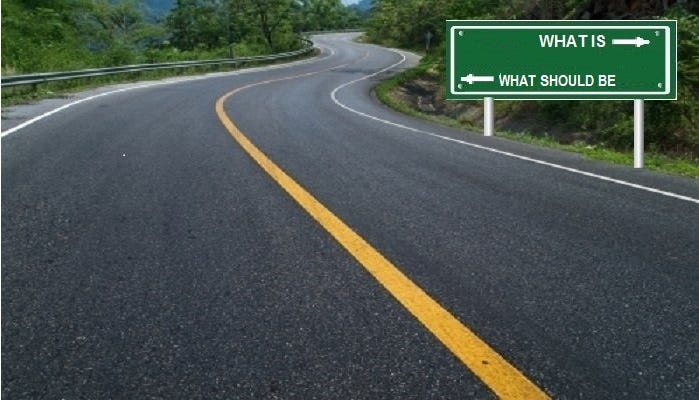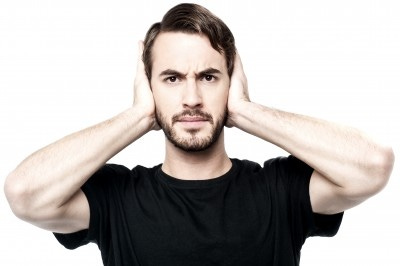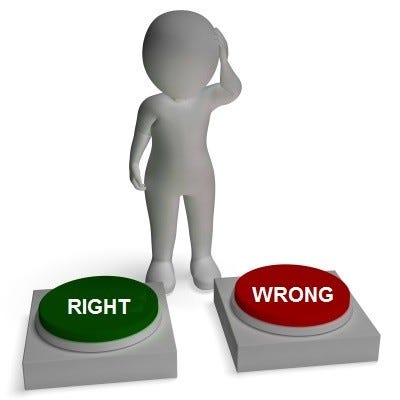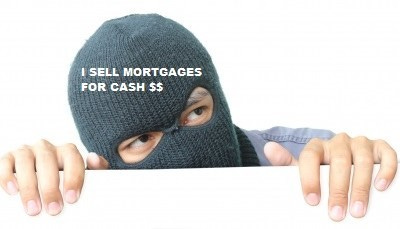Don't Mistake What Is For What Should Be
A REDUX OF A PIECE I FIRST PUBLISHED IN 2016, THE YEAR THE ORANGE MAN WAS ELECTED PRESIDENT OF THE U.S. AND MAGA OFFICIALLY MORPHED INTO A RELIGION
Preface: This is the fourth in a series of literary and philosophical self-indulgences, which I’ve dubbed The Road Chronicles because they use the concept of a journey along a highway as a central organizing metaphor. This particular installment came together during a season of dark reflection, during the run-up to the 2016 presidential election. And as we head toward the election of 2024, it seems especially appropriate to republish it now.
I've said it before, but it bears repeating: I am not a fan of Reinhold Niebuhr's Serenity Prayer. Because, to my mind, the refrain de facto supplies an excuse for doing nothing about what is wrong in this world.
This so-called prayer, you will remember, goes as follows:
O God, give us the serenity to accept what cannot be changed, the courage to change what can be changed, and the wisdom to know the one from the other.
Which, I suppose, might be okay — if you ignore the all too common human foibles of ethical and moral inertia, not to mention the natural human tendency to self-protective timidity.
When I was a philosophy graduate student, I wrote a paper arguing that the central issue of ethics and morals is not whether to do what's right, but rather to figure out what is right to do. My central thesis was, and remains that people — except possibly true sociopaths — universally want to do that which is right; they just differ in what they perceive that to be.
That is why, I suggest, some of the most heinous figures in human history have gone to great lengths to dehumanize the victims of their acts. Because even the depraved more often than not feel the need to do what's right and, therefore, seek to rationalize and/or justify their terrible acts. Human beings are simply hard-wired that way.
But being hard-wired to do what's right, makes it absolutely essential that we develop and exercise our ability to sort out what's right from what's not — and not mistake what is for what should be.
These days, there is no shortage of things that are wrong in the world, in our nation, and indeed in our more immediate vicinity of work and home. There are wars ongoing and more and more terrorism brewing on the world scene. There remain racial and economic disparities in the U.S., which can by no stretch of the imagination be justified on the basis that things could not be any better. And there are day-to-day incidents of ethnic, sexual, and age discrimination and injustices, which by all reasonable measures should have been eliminated decades ago.
Yet, instead of seeing a growing unrest and impatience with respect to righting the wrongs, and healing the ills of society, we are actually seeing more and more personal reluctance and social inertia growing up against doing anything about any of it. Even just to the extent of speaking out against injustices and social ills.
A prime example is what occurred running up to, and in the aftermath of the bubble-burst in the U.S. residential real estate market. What we saw during the years 2007 to 2010 was the largest single transfer of wealth from the many to the few, in the history of this nation. Do not delude yourself, while many lost most of their savings for the future, a relative few walked away with additional millions, indeed billions of dollars in their wallets. And yet amid the economic terrorism and slaughter, few, if any voices were raised against allowing the venal and greedy progenitors of the collapse to profit from their outright skullsuggery, dishonesty, and corruption.
If you are not fully aware of events leading up to the failure of the U.S. real estate market and don't have the wherewithal to wade through the dry tomes of facts that have been published by researchers and academics, then at least call up and watch the movie, The Big Short. For despite the occasional exercise of literary license, it contains the basic elements of the true story of unprecedented malfeasance, greed, and outright thievery at the highest levels of the U.S. financial sector.
What is striking in this case is the relative quiet about the injustices perpetrated not only by the players in the collapse, but by the government in its aftermath. Even the normally nattering ninnies of the national press were relatively quiet when it came to the event and the bail-out that followed, as the government struggled with taxpayer money to forestall collapse of the nation's economic system and possibly that of the world.
The reason for the virtual silence was, I submit, the lack of a clear idea as to what was right to do in the situation. If some of the banks and fellow travelers were "too big to fail," then wasn't the government just doing what it had to do? If you put a lot of the top-level perpetrators in jail for their dishonesty and malfeasance, who would be left with sufficient knowledge and skill to run the system? Wasn't it just better to accept a situation that could not be changed without potentially making it worse, and so wasn't the right thing to do, to do nothing? For if you can't really do anything about the problem, isn't it wiser just to accept the situation? Thank you, Reinhold Niebuhr. — for nothing.
I ask you, where have all the "angry men (and women)" gone? Where are the marchers who braved injury and death in the service of bringing a measure of racial and social justice to this nation? Where are the protesters who forced an incumbent president not to run for re-election, and who ultimately stopped a futile war of U.S. military adventurism, for which we are all, including our now largely-ignored military veterans, still pay? Curled up with a copy of Reinhold Niebuhr's collective works, thank you.
Understand this is not a political rant. It’s a lament for the return of the days when we thought it important to have a moral and ethical compass. When we thought it important to have and foster a sense of righteous outrage and express such in the face of what is, but should not be.
Let’s be clear about this, especially during a presidential election year: To stand silent is tantamount to endorsing what is; and to withhold your vote (because you don’t like either of the alternatives) is tantamount to giving this election away to the dark forces of autocracy which are working to destroy U.S. democratic process. This is a time when we don’t have the luxury of standing aloof from the fray.
My personal hope is that 2016 (2024) will usher in a new era of activism, at the very least, an era of greatly increased vocalism. An age in which it is again held legitimate to openly criticize injustices and call out wrong-doers — and vote against those who openly despise those values — be they high-born or low, on the red side of the aisle or blue. And be they members of Big Business or war mongers and terrorists. For speaking out in these ways is the best means for ensuring that, as a society, we don’t ultimately fall into mistaking what is for what should be.
— Phil Friedman
Copyright © 2016-2024 by Phil Friedman — All Rights Reserved





